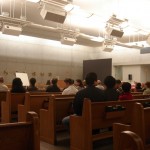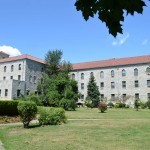I’ve always found the last words of today’ parable a bit troubling. Jesus is telling his disciples, men who have committed their lives to him, that when all is said and done, the only thing they can say about themselves is’ we are worthless slaves we have done only what we ought to have done.
There can be a temptation of those who take their spiritual lives and growth seriously to wonder how they are doing? They want to step back and take a look at themselves, take a bit of their spiritual inventory. They question, am I making progress, am I growing more spiritually? Am I any more Christ-like? This approach never works. We live by faith and not by sight.
We cannot earn the love of God. We don’t deserve the love of God, it is freely given. St. Paul teaches, ‘before the world began God chose us in Christ to be his adopted children.’ St. John echoes this thought we he writes, ‘this is the love, not our love for God but God’s love for us when he sent his son into the world to be our savior. God’s love for us is not our entitlement, it is a gift.
We spend our lives trying to respond to this great gift by living lives worthy of our calling as Christian people. When all is said and done we have done only what we have ought to have done – been faithful to marriage vows – tried to pass on faith and sound values to our children – been honest in our dealings with others – tried to help those in need as best we could, tried not to be suckered into prejudice and bigotry toward those different from ourselves, tried not to judge others of different faiths, cultures or life styles, tried to be faithful to a life and time of prayer – tried to live a life that was faithful to the teachings of Jesus – tried to trust in God’s love for us, tried to trust that our sins and failures are things of the past. We have done only what we ought to have done.
Fr. Ron Rolheiser has this reflection on these final words of today’s gospel. “What Jesus is doing in this parable is drawing the distinction between what comes to us by right as opposed to what comes to us as gift. If each of us were given only what is owed to us, we would live like that servant just described. But we are given more, infinitely more. The real task of life then is to recognize this, to recognize that everything (life, love, others’ service to us) is gift and that we need to keep saying thanks over and over again for all the things in life that we so much take for granted … recognizing always that it is nobody’s job to take care of us.’
As we continue to celebrate this Mass we pray for ourselves and for each other that we be blessed with a deep attitude of gratitude for all the blessings that come our way.
 Founded by St. Paul of the Cross, every Passionist takes a special vow to spend his or her energies in promoting remembrance of the sufferings of Jesus, the memory of the Cross, and reflection of the meaning of the Cross for the world.
Founded by St. Paul of the Cross, every Passionist takes a special vow to spend his or her energies in promoting remembrance of the sufferings of Jesus, the memory of the Cross, and reflection of the meaning of the Cross for the world.




